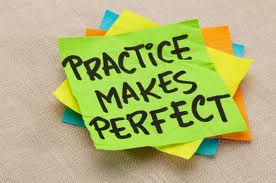 "Practice makes perfect" - who hasn't heard this experssion?! Or "how do you get to Carnegie Hall? Answer: practice, practice, practice." But does practice - even perfect and practice - always lead to perfection....or success? Sometimes, the quest for perfection can become a fool's errand. Perfection, in reality, is quite unattainable. Even Roger Federer, with all of his Grand Slam wins and record, has been less than perfect. Even while going on month-long streaks of being undefeated he has lost points, has lost games and has lost sets. He has made numerous unforced errors, mishit balls into the stands, hit double faults and dumped easy sitters into the net. However, in doing so, he has remained - at least for that particular duration - fairly "perfect" in one important category: wins.
"Practice makes perfect" - who hasn't heard this experssion?! Or "how do you get to Carnegie Hall? Answer: practice, practice, practice." But does practice - even perfect and practice - always lead to perfection....or success? Sometimes, the quest for perfection can become a fool's errand. Perfection, in reality, is quite unattainable. Even Roger Federer, with all of his Grand Slam wins and record, has been less than perfect. Even while going on month-long streaks of being undefeated he has lost points, has lost games and has lost sets. He has made numerous unforced errors, mishit balls into the stands, hit double faults and dumped easy sitters into the net. However, in doing so, he has remained - at least for that particular duration - fairly "perfect" in one important category: wins.
What we can learn from this simple annecdote is that if you want to achieve great results, you have to discard pure perfection. As a player (and, perhaps, more importantly a parent or coach), you have to accept that fact that YOU WILL NEVER EVER BE PERFECT. You are not a perfect human being and you are never going to play a perfect match. Tennis is as much art as it is science and it's the opponent's job to make you play as imperfectly as possible. If you have the tendency to become obsessed with minuscule perfection - whether in practice or in a match - you miss stunting your development in the long-run. For example, have you noticed that player whose warm-ups seem to last 45 minutes or longer? If you're like us, there is always one or two in the proverbial bunch. They always want to hit "one more ball", "one more overhead" or they haven't quite gotten "the feel" of the ball just right and want to do another rally...then another rally...then another rally and so on 'til Kingdom come. These players think that if they somehow get things "just right" then things will magically fall into place for them. The problem with this type of mentality is that, rather than focusing on what's important (e.g. performing specific drills) the players get bogged down on generalities. With limited time at their disposal - and having spent 45 minutes to an hour on just "warming up" - how much more time or energy will they have to practice what's really important?! Not a whole lot. These players are guilty of trying to fight a perfect war. There is no such thing. If you engage in battle you have to accept some casualties..move on! You can't possibly protect every soldier and you can't possibly win every point. Move on!
Loosen up and then work on things that are likely to pay the most dividends. Sure, if there's a particular kink in your game be specific about it and address it but without getting obsessed with it to your detriment. Use the warm-up for its primary purpose: getting your body ready for action. In a match, do not let errors drag you down. If you become obsessed with your mistakes you risk allowing the match to spiral out of control. You're like a boxer who's focusing too much on her jab...while getting pummeled by the opponent. Jab doesn't work?! Great. Beat the opponent with your hook; or uppercut. In practice, if you focus too much on your "weakness" you risk ignoring other parts of the game which may come to cost you when it matters.
 For best results, seek excellence rather than perfection. Excellence leaves room for error...for humanity. And imperfection is beautiful. Think of all the great works of art that have been created through the ages. From paintings to sculpture and music, how many can you name that have been created by robots or machines? You can name a Da Vinci painting, a Michellangelo statue or a Mozart composition without much effort. All of these works of art are imperfect. And that's what makes them beautiful. It's like the leaf in the picture on the right: it's is grimy; it is old and yellow; it is sitting in mud; maybe the lighting isn't the best. You take every single one of these elements individually and none of them are very awe-inspiring. However, you put them all together and it creates a very appealing and eye-pleasing experience. You have to approach the game of tennis in the same way. Accept the fact that sometimes you have to sometimes kick and scrape for a ball. Accept the fact that you will make easy mistakes or the fact that the opponent will play better points than you will. Accept the fact that some of your shots may not be there when you need them. Accept these things but learn from them and you will become a better person and a better player. Discard the quest for perfection for the concept of wabi-sabi - briefly, the attitude that there's beauty in imperfection. Wabi-sabi is the tasty food that you get from a street vendor; it's the memorable vacation that you have when you forget your best poutfit at home and hunt for a replacement in a foreign country; it's the impromptu concert that is given in a park by an unknown performer; and, in tennis, it's the shank forehand winner on a ke point or having to dig deep and rely on your physical characteristics and wit rather than technique. Embrance imperfection as part of the process and the attidude becomes the hot ait balloon that pulls you up rather than the anchor weighing you down. Work on being excellent and balanced. Discard academic theory about how a shot needs to be hit and how a play needs to be executed and focus on the practical aspect of the sport; keep in mind that when you're practicing one thing you're not practicing something else...and it's the thing that you do not practice that will lead to your downfall.
For best results, seek excellence rather than perfection. Excellence leaves room for error...for humanity. And imperfection is beautiful. Think of all the great works of art that have been created through the ages. From paintings to sculpture and music, how many can you name that have been created by robots or machines? You can name a Da Vinci painting, a Michellangelo statue or a Mozart composition without much effort. All of these works of art are imperfect. And that's what makes them beautiful. It's like the leaf in the picture on the right: it's is grimy; it is old and yellow; it is sitting in mud; maybe the lighting isn't the best. You take every single one of these elements individually and none of them are very awe-inspiring. However, you put them all together and it creates a very appealing and eye-pleasing experience. You have to approach the game of tennis in the same way. Accept the fact that sometimes you have to sometimes kick and scrape for a ball. Accept the fact that you will make easy mistakes or the fact that the opponent will play better points than you will. Accept the fact that some of your shots may not be there when you need them. Accept these things but learn from them and you will become a better person and a better player. Discard the quest for perfection for the concept of wabi-sabi - briefly, the attitude that there's beauty in imperfection. Wabi-sabi is the tasty food that you get from a street vendor; it's the memorable vacation that you have when you forget your best poutfit at home and hunt for a replacement in a foreign country; it's the impromptu concert that is given in a park by an unknown performer; and, in tennis, it's the shank forehand winner on a ke point or having to dig deep and rely on your physical characteristics and wit rather than technique. Embrance imperfection as part of the process and the attidude becomes the hot ait balloon that pulls you up rather than the anchor weighing you down. Work on being excellent and balanced. Discard academic theory about how a shot needs to be hit and how a play needs to be executed and focus on the practical aspect of the sport; keep in mind that when you're practicing one thing you're not practicing something else...and it's the thing that you do not practice that will lead to your downfall.